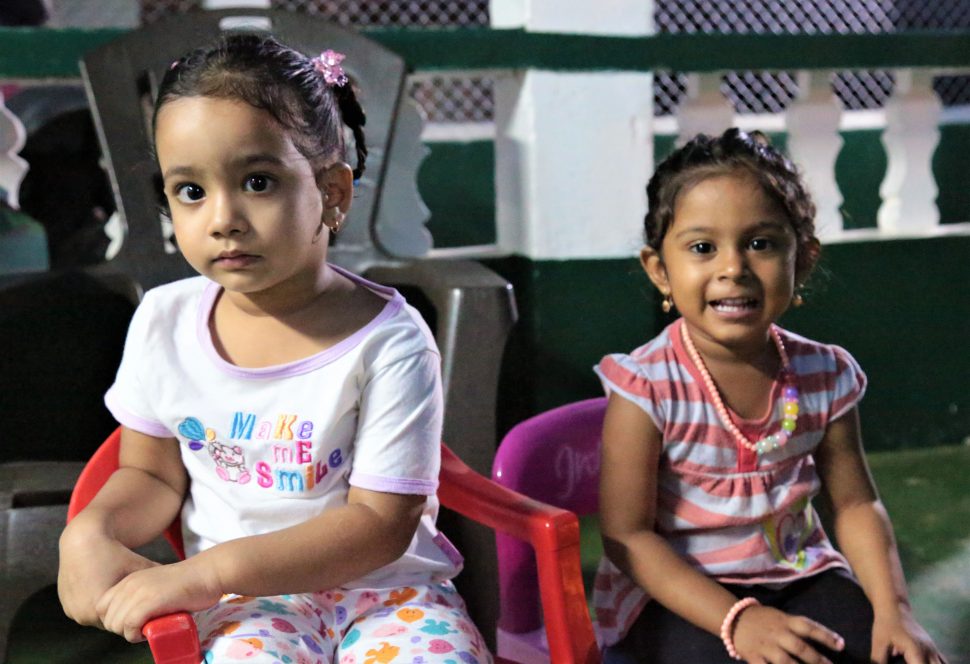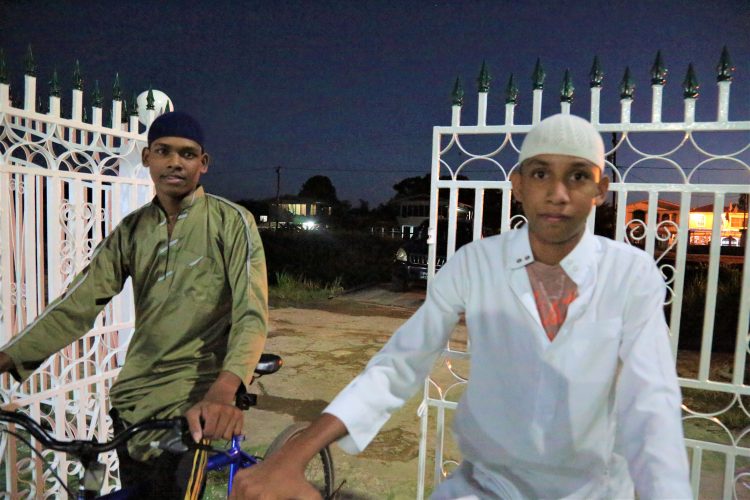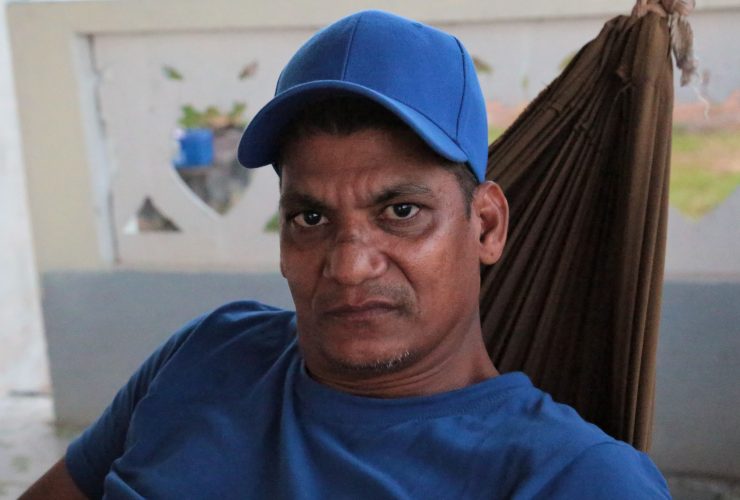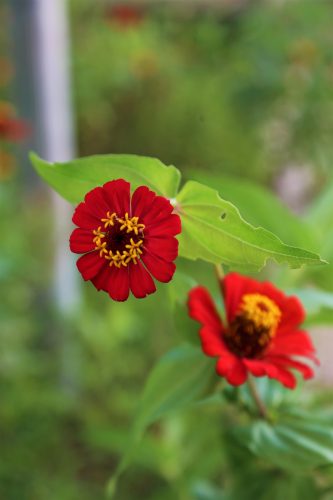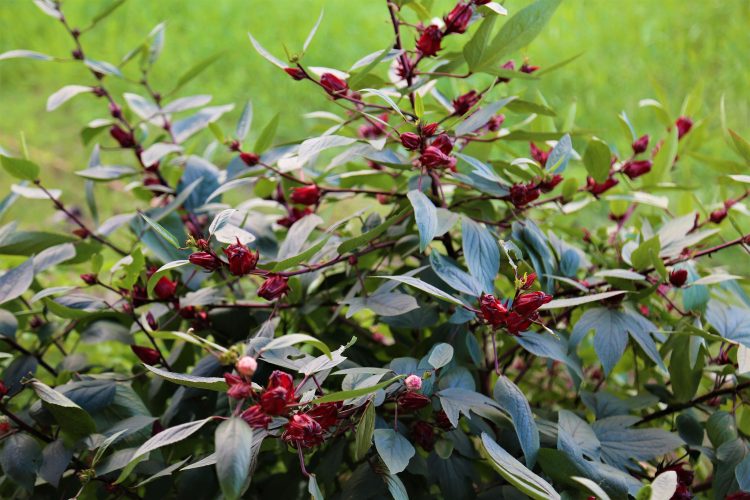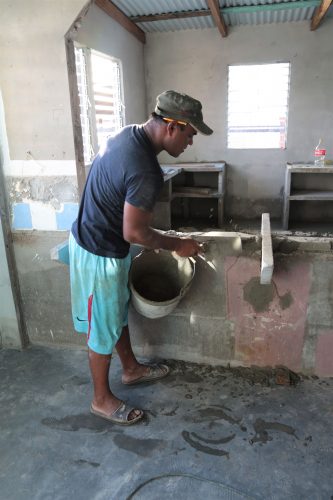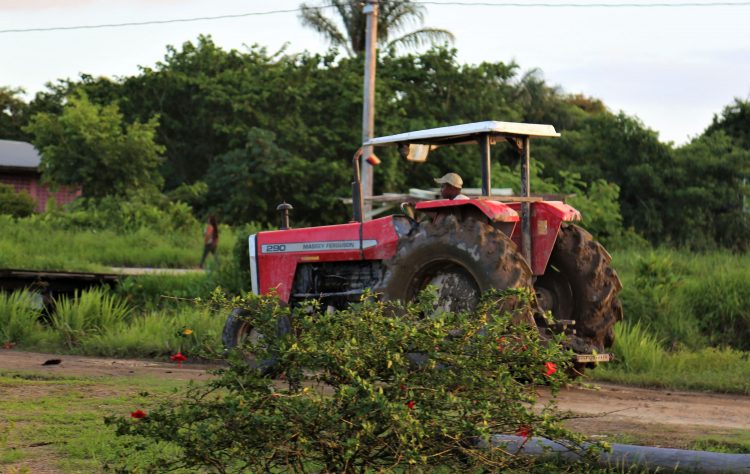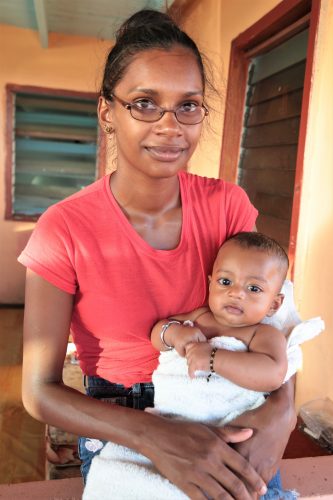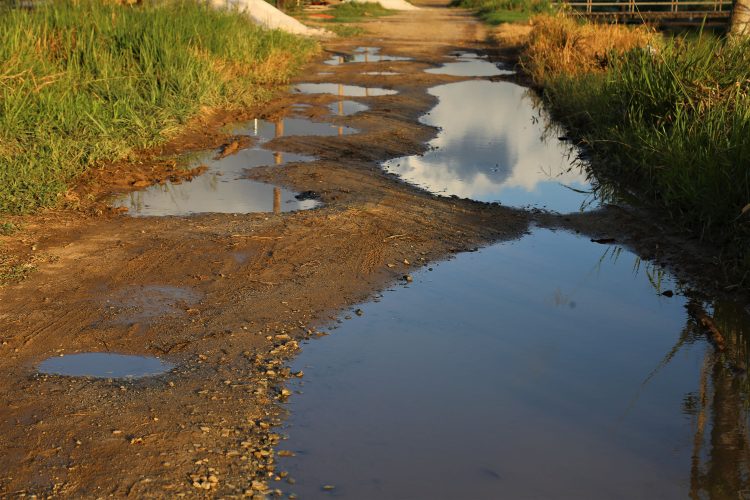Two Brothers Village sits between Mon Bijou and Vrede-en-Vriendschap along the dam running parallel to the Canal Number One Public Road. The village is believed to have existed since the early nineteenth century and today has approximately 100 residents.
As per norm this season, rain water filled potholes were pedestrians’ bane. As is the custom this season also, everyone was in the cleaning spirit; window curtains hung to dry on clothes line, women were attacking walls with their brooms and wire brushes and the few men who were at home were doing renovations. At the time of my visit less than a handful of homes were already decorated for Christmas.
The village is known for the Two Brothers Primary School which houses the Nursery Department and the Grade Seven Class of L’Adventure and a business that makes Vasanti curry powder. There are no places of worship, though residents belong to the three major religions but they go to nearby villages which have such.
At one home, chuckles filled the air, three-month-old Adrian had just been given a bath by his mother Lakmattie Bessoondiyar well known as Netu. She told the World Beyond Georgetown that she was born in Jacoba Constantia and only moved to Two Brothers four years ago. Living in Two Brothers, the woman noted, is quieter than Jacoba Constantia, which might be because it is on a dam instead of along the public road.
Farming is the main economic activity and Netu has a small kitchen garden. She grows calaloo, pepper, watermelon, bora, cucumber, pumpkin, corn and ochro. Netu shared that she grew up working on the farm with her parents, so farming is in her blood.
Christmas in the village, Netu said, attracts family and friends alike and while some families enjoy the food, toys and movies together, others delight in booze and music. “For Christmas, we usually make fried rice, chowmein, sometimes yellow rice with baked chicken and baked fish and chicken pepperpot. We make the first set of pepperpot for Christmas and Boxing Day and a second set for Old Year’s and New Year’s,” Netu said. However, what makes this Christmas extra special for her is spending Christmas with her husband and their newest addition to their family.
Living in the village, she said, so far has been a wonderful experience. The people are always friendly and good-mannered always sharing vegetables or fruits from their farms.
As regards challenges in the village, Netu could not think of any, but noted that the village could benefit from an upgraded road and street lights.
Deodat (only name) is a pineapple farmer in Two Brothers who plants on a large scale and showed me his huge acreage. The man was born and raised in the village and said that according rumours he has heard over the years, when the country was Dutch Guiana sometime in the early 1800s, each plantation had 100 rods width and two brothers who purchased the estate equally divided the land between themselves.
A lot has changed over the years, Deodat noted. While many persons have migrated or died, others developed their houses. What has not changed is the villagers being closely knitted and most yards being separated by flowering plants and kitchen gardens instead of fences.
As a boy he attended Two Brothers Primary School and later Patentia Secondary but didn’t get far in his secondary education. Upon leaving school, Deodat took up farming. “Things were hard then back in the early 80s. We did non-traditional farming, mostly pineapples, cassava, plantains and banana as well,” Deodat said. Then he was still too young to travel to the Stabroek Market to sell the produce with his parents. Today hucksters visit him to buy his pineapples.
“Two Brothers is very quiet, and everyone lives in harmony,” he told me. “There’s no animosity among people here. No matter which part of this world you were born in, you are emotionally connected to that place and though I would have lived for short periods in various places, Two Brothers is the best place that I’ve ever lived. The memories are here. Apart from that it’s a very independent place and one could never go hungry here. There’s always something to plant and reap or the neighbour has something if you don’t have. You can go catch fish to add to whatever dish you’re making. The land space is huge; it’s self-sufficient here.
“Back when I was little, we reared cows and sheep and we’d have to be in the backdam seven days a week to graze them, so we’d be in the backdam before and after the school. We had bush cooks all the time. We’d get provision from the backdam which we boil to make soup. We catch fish to add it to the pot or steal a piece of salt fish from the ‘Old Lady’ [his mother] that she got from the market. We’d cut the sucker leaf and use it as our plate. To cook the food, we had the Canada Best milk tins that we used to bore two holes through and run a wire through, dig a hole, make a fork from wood and hang the tin over the fire in the hole…”
His work in the backdam begins at 5 am every day. At 10 am he takes a break and returns at 3 and works until sunset.
Reflecting on his childhood, Deodat said while children today are looking for the latest gadgets come Christmas morning, he used to be excited over receiving a balloon and then later that day settling down to snakes and ladders with his family. He remembers having to run behind the yard fowls (the Christmas specialty) they were saving all year for this holiday. Today with all the goodies that comes with the holiday, for Deodat there could never be Christmas without fruit cake. His family he said would go all out in preparing dhall puri with chicken, duck and mutton curries in addition to baked macaroni and chowmein with baked chicken.
Listing some of the benefits of living in Two Brothers Deodat said the village is almost crime free, it is self-sufficient – one doesn’t have to go to the market to get fresh fruits and vegetables, persons can farm and though they may not have their own farms they have the option of renting one. Being a farmer means that you get to be your own boss and can choose your own hours to work, the availability of transportation is another benefit and being situated about 20 minutes from Georgetown where one can sell one’s produce.
Deodat said the area was set out during the years of the Dutch and it needs to be redesigned as regards drainage and irrigation. December, the man said, brings excessive rainfall and almost every year farmers are affected by flooding, including himself. Sadly, he noted, though officials from this administration and the past would have visited they are never compensated.
“We have the land here to produce everything,” he said. “The guys at the front here, they plant rice. We have sugar cane, oranges, tangerines, limes, lemon, coconut, banana, plantain, cassava, eddo, yam, everything grows here. Mangoes, too much mangoes, cashews, oh my goodness! The government needs to give business people incentives. Look at Trinidad and Jamaica, they don’t produce all these things, but yet we are the ones importing from these places. We need to have a place where we can preserve these fruits. When the mangoes come in is so much but it only last for two or three months in the year so if you get a facility to preserve these fruits and then you can juice them throughout. You’re not going to have oranges all year or tangerine but if we have a facility to store our fruits then we can have juice throughout the year and have our juice exported. We can also make our own wine. Our fruits are spoiling by thousands of dollars in worth. Getting a facility would also provide employment and revenue.”
Nearby, Deodat’s mother, Betia (only name) sat on a chair chatting with her grandsons. She is the oldest resident in the village at 85 years old but is still very active. She was making roti before we spoke. Betia hails from Susanna’s Rust, Upper Demerara River and moved to Two Brothers when she was 19. Life at Susanna’s Rust moved strictly by boat and whenever residents needed to get to Georgetown, they went by way of the RH Car Ferry. Though moving to Two Brothers made life less challenging for the woman with regard to transportation and being closer to the city, she was particularly challenged in having to walk 200 rods into the backdam for water at a pond, unlike at Susanna’s Rust where they lived by the riverside. Betia, a mother of 11 children, two of whom are deceased, said that many of her children were delivered at home by a midwife with only a few being born at a hospital. Life, she indicated, was very hard having to raise so many children and many of her days were spent toiling long hours in the backdam even while she was pregnant. Nevertheless, Christmas has always been a joy for her and her family and this Christmas she looks forward to spending her time with her children and grandchildren.
Elizabeth Ramsaroop better known as Florrie was born in Vrede-en-Vriendschap. For part of her married life she lived at Best Road, Plantain Walk and New Road but for the last 40-odd years Florrie has been living in Two Brothers. “It’s really nice and quiet here. It feels safe. Christmas here compared to the villages I lived at is more family oriented; family, friends and neighbours all together,” she said. Christmas comes with a variety of dishes for this family but pepperpot is their specialty.
At 78, Florrie still farms, planting citrus among other fruits. In earlier years, she sold her produce at Bourda Market but now depends on huckster to come and purchase from her. She requests that their road be fixed adding that a better road would make it easier for buyers to get to her when they need to.
Florrie lives with her son and his wife and upon my arrival they had just returned from their church, Emmaus Gospel Hall Christian Brethren situated in Mes Delices, opposite Two Brothers where they were assisting the children in preparing for an upcoming Christmas concert.
At one house, two cousins Hafsah and Asiyah ran after each other laughing playing in the yard still a bit wet from the rain earlier. They seated themselves in chairs for a photo while their grandparents happily looked on.
And while the rain may have put a damper on some of the things that needed to get done, the flowers perked up even more, and the red ones seemed to be wishing me a Merry Christmas.
